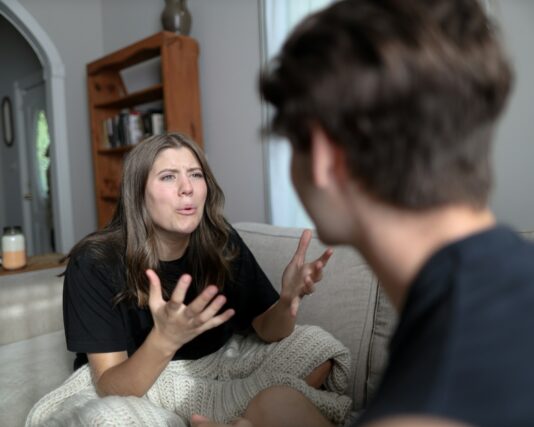A pattern of unhealthy relationships is bound to leave its mark on a person in ways they don’t even realise.

When someone’s only ever known toxic connections, it often shows in the way they speak—about love, about themselves, and about what they think is “normal.” These phrases might sound harmless at first, but they’re often little red flags that reveal just how much emotional damage they’ve internalised. If you hear someone saying these, or if you catch yourself saying them, it’s worth pausing to ask where those beliefs came from, and whether they still serve you.
1. “I don’t want to be a burden.”

This one comes from someone who’s been made to feel like their needs are too much. When you’re used to being dismissed or criticised for expressing vulnerability, it starts to feel safer to stay quiet and carry the weight alone. But the truth is, needing support doesn’t make you a burden. It makes you human. This is often a mask for deep self-neglect learned through emotional rejection.
2. “It’s fine, I’m used to it.”

That quiet resignation usually hides a lifetime of being let down. When people say this, they’re not actually fine—they’re just used to lowering their expectations to avoid more disappointment. It’s not strength, it’s survival. And while it’s totally understandable, it’s also heartbreaking when someone stops believing they deserve better.
3. “I don’t really believe in happy relationships.”

After enough toxic experiences, it’s easy to confuse dysfunction with reality. This kind of phrase is usually said to manage disappointment before it arrives, as if expecting misery will soften the blow when it happens. Of course, behind the cynicism is often deep hurt. It’s not that they don’t want connection—it’s that they’ve stopped trusting it’s possible.
4. “Love is supposed to hurt sometimes.”

This one gets passed around like wisdom, but it’s really just a scar dressed up as insight. Of course relationships take effort—but pain, fear, or emotional instability shouldn’t be the norm. People who say this often grew up or lived in environments where love and pain were fused. Untangling that belief takes time and safety.
5. “I can’t tell them how I really feel—it’ll just cause drama.”

This phrase reveals a deep fear of conflict rooted in past backlash. When honesty has previously led to punishment or manipulation, people learn to stay quiet, even when it hurts. It’s a sign that they’ve been taught to associate honesty with chaos, rather than clarity and growth.
6. “They get angry, but at least they care.”

This is a classic confusion between intensity and affection. When someone’s only experienced love through jealousy, rage, or control, they start to equate it with passion or proof of devotion. It’s a dangerous narrative—one that keeps people stuck in cycles of emotional volatility, thinking it’s a sign they’re valued.
7. “I just have high walls. People don’t really get close to me.”
 Source: Unsplash
Source: Unsplash That might sound self-assured, but it often stems from pain rather than pride. People say this after learning that vulnerability leads to betrayal, not connection. They’re not cold—they’re hurt. And they’ve built those walls to survive, not because they actually want to be alone.
8. “I probably deserved it.”

This one is heartbreaking because it shows just how effective long-term emotional manipulation can be. When someone’s constantly blamed for everything, they start internalising that blame, even when it’s not theirs to carry. It reflects a warped view of self-worth that’s been shaped by gaslighting and chronic invalidation.
9. “If I just do everything right, they won’t leave.”

This kind of thinking reveals a relationship where love was conditional—where staying “safe” meant performing perfectly at all times. That’s not love, that’s fear disguised as compliance. It’s exhausting, and no one should have to earn love like it’s a prize for good behaviour.
10. “I don’t expect much from people anymore.”

Lowering expectations might sound like wisdom, but it’s usually the result of too many broken promises. When someone stops hoping, it’s often because hope hurt too much. Underneath it is grief—a quiet, exhausted kind that settles in when trust has been worn out completely.
11. “Everyone leaves eventually.”
 Source: Unsplash
Source: Unsplash This one cuts deep. It’s usually said with a laugh or a shrug, but it’s a mask for abandonment wounds that never really healed. If you believe this, you start sabotaging good things before they can leave you. It’s easier to push people away than wait to be dropped, but it’s also lonely, and it doesn’t have to be your truth forever.
12. “They only lash out because they’re hurting.”
 Source: Unsplash
Source: Unsplash Empathy is a strength, but this phrase often becomes a tool to excuse cruelty. When someone’s always had to justify the behaviour of toxic people, they learn to twist pain into permission. It’s important to understand people’s pain—but it’s also vital to protect yourself from being its target.
13. “I don’t need anyone—I’ve got myself.”
 Source: Unsplash
Source: Unsplash Independence is valuable, but when this phrase is said with a hint of bitterness, it often signals someone who’s had to survive alone for too long. They didn’t choose independence—they were forced into it. It’s not that they don’t want support—it’s that they stopped believing it would ever arrive without strings.
14. “Maybe I’m just too much.”
 Source: Unsplash
Source: Unsplash People only say this after being made to feel like their needs, emotions, or personality were overwhelming or annoying. In toxic relationships, even basic emotional expression can be treated as a flaw. Of course, this isn’t self-awareness—it’s self-rejection, and it grows in places where love was withheld in exchange for silence.
15. “If I open up, they’ll leave.”

Being vulnerable should feel safe, but when it’s been met with punishment or withdrawal in the past, people learn to associate openness with loss. So, they keep everything inside, convinced it’s better to be misunderstood than abandoned. This phrase is a quiet cry for safety that never came.
16. “I just want to feel chosen for once.”
 Source: Unsplash
Source: Unsplash That sentence doesn’t come from entitlement; it comes from emotional starvation. It reflects a history of being the afterthought, the backup plan, or the one doing all the chasing. It’s a desire for mutuality—a longing to feel wanted without having to earn it through over-functioning.
17. “I’m probably overreacting.”

This is a phrase born out of chronic gaslighting. When your feelings have been constantly questioned or dismissed, you start to doubt them yourself, even when they’re valid. It’s one of the clearest signs that someone has been taught to distrust their own reality, and it’s deeply damaging.
18. “They’re not always like that.”

Trying to justify someone’s harmful behaviour by pointing out the good moments is a classic trauma response. It’s what happens when you’ve been trained to cling to crumbs and ignore patterns. It’s an attempt to make sense of the chaos. But no amount of good moments can cancel out consistent harm.
19. “At least they didn’t cheat.”

This one shows just how far the bar has dropped. When someone starts framing the absence of betrayal as a relationship highlight, it’s a sign they’ve been exposed to serious dysfunction. It reveals a mindset where basic decency is seen as impressive, which means they’ve likely never experienced real emotional safety.
20. “I don’t even know what a healthy relationship looks like.”
 Source: Unsplash
Source: Unsplash This one is said with honesty—and often, quiet grief. It’s the admission that love has never felt safe, consistent, or kind. It’s a place of deep unlearning, but also the beginning of real change. Because naming it is the first step. Once you realise what you’ve been calling “normal” was actually toxic, you start to open space for something better. And that’s where healing begins.




